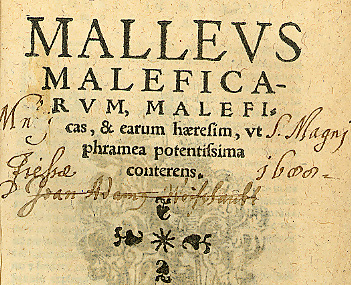 |
| Cover of the seventh Cologne edition of the Malleus Maleficarum, 1520. |
Take a look out your window this weekend and I bet you’ll spot a witch. Fortunately, curses over the next few days can probably be warded off with candy. But the sugar-oriented goals of the Halloween witch set belie the long and sordid history of broomsticks and spells. Always keen to dig into the long and sordid history of anything, I paid an All Hallows visit to a couple Dal professors for the inside scoop on what’s beneath the pointy hat.
Kathryn Morris, who teaches , says no one’s certain of the origins of the Halloween witch.
“There is a great deal of scholarly controversy about the sources of this new idea of witchcraft… whether it emerged from the learned elite or… from folk beliefs,” she says. “The idea that stories of witchcraft were based on the actual activities of a pagan fertility cult has been widely discredited.”
Chris Helland refers me to an anthropological archetype referred to as the “nightmare witch” -- a nasty lady about as far from Hermione Granger as Kansas is from Oz. Like her mythical counterparts, the revenant (i.e. Edward) and therianthrope (i.e. Jacob), the nightmare witch is a figure found in legend and superstition worldwide.
“Different cultures have sort of different versions… for the most part it’s female,” says Dr. Helland, who teaches . The figure’s femininity is unusual – revenants, for instance, are usually associated with males. “A lot of the time it’s a Death and the Maiden kind of thing.”
Broomsticks
But in the case of the nightmare witch, Death IS the maiden. And, according to Dr. Morris, she’s been accessorizing the same way for a very long time. “Early modern witches did indeed fly on broomsticks,” Dr. Morris says of the myths, “Though they sometimes used other modes of transportation.” The broomstick’s Freudian significance enhanced its popularity. “It was a nifty phallic symbol.”
And what did witches do when not creating innovative green transportation? “It was widely believed that they killed and ate babies and (at the witches' sabbaths) engaged in orgiastic sex with Satan and each other,” says Dr. Morris. Bet any Halloween party you’ve ever been to sounds pretty tame by comparison. Beyond that, witches spent their time being as thoroughly disagreeable as possible. “They were accused of causing bad weather, crop failures, miscarriage, impotence, illness and death.”
The modern mind boggles at the idea that people believed their neighbours were calling up hurricanes and engaging in supernatural cow-tipping. But it’s true. “The belief in diabolical witchcraft is hard for us to understand, but it was widespread… and deadly serious,” says Dr. Morris. “The belief that Christian society was being threatened by an army of witches was (of course) one of the reasons why the great witch-hunts occurred.”
The witch-hunts, Dr. Helland tells me, were spurred on by the Malleus Maleficarium – the Witches’ Hammer. The text, written by two monks in the 15th century, was a medieval how-to for exterminating witches. I’ll spare you the details, but its gruesome methods for determining a witch’s guilt have nothing to do with weighing the same as a duck. “If you read the Malleus Maleficarum, these people believed what they were talking about,” says Dr. Helland. “It’s horrific in a way, but I think they really believed that it was true.”
Those persecuted for witchcraft were usually female. “The concept of the nightmare witch is, it’s the opposite of everything that’s good,” says Dr. Helland. “In a patriarchal society, women in positions of power are going to fit into the image of the witch.”
Sabrina
Fortunately for herbalists, midwives, and cat ladies everywhere, Dr. Morris says that “the witch-hunts went into a sharp decline in the period from 1650 to 1750, although there were certainly isolated cases after that… as the witch became less scary, she began to appear in stories and children's literature. It's a process of taming or domestication that we seem to repeat every Halloween.”
But the eradication of belief in witches and magic isn’t universal. “Still in Africa a lot of people are killed every year for witchcraft,” says Dr. Helland. And in North America, friends and neighbours might be casting benign spells – without even knowing they’re doing it. “Baseball magic… (look at) sports. People trying to use supernatural mechanisms to improve their performance.” Dr. Helland is careful to point out that modern pagans and workers of magical ritual have nothing to do with the “nightmare witch” archetypes. “It’s very common in a lot of cultures for someone to have a job as a sorcerer,” he says, and also adds that “the concept of the nightmare witch has nothing to do with people who practice Wicca.”
Looking back on the Witches’ Hammer and the nightmare witch, it’s hard to believe that our culture’s deepest fears are now its most adorable Halloween costumes. As Dr. Morris puts it, “It's kind of crazy that we dress our children up as Satan-worshiping baby-eaters!”
Eat some candy corny and be thankful that Sabrina, the Teenage Witch is getting a good education at Riverdale High.
